Activities
Mapping
To make sure PubCirEco (Project No. ERASMUS-EDU-2024-CBHE 101179344) truly addresses the real needs of the labour market and institutions, we started with a comprehensive mapping activity across our partner countries. In March 2025, we gathered 800 survey responses from organisations in Ukraine, Lithuania, Austria, Estonia, and Moldova, giving us valuable insights into how Circular Economy ideas are understood and applied, and pinpointing where support can make the biggest difference.
What we learned:
- Awareness is steadily increasing, though unevenly: roughly half of respondents feel confident in their Circular Economy knowledge, describing themselves as “good” or “very good.” The other half, however, see their familiarity as only average or limited, highlighting room for further learning.
- Action is already happening: most organisations report at least partial implementation, especially in resource efficiency, waste reduction/recycling, and social responsibility.
- The biggest value drivers are how organisations see the Circular Economy- mainly connecting it with enhancing their reputation, fostering innovation and growth from within, making a social difference, and creating positive local environmental effects.
- The main obstacles are practical rather than legal. The biggest challenges we face are not knowing enough and having limited resources. This highlights the importance of providing hands-on tools, sharing best practices, and offering targeted training to help overcome these barriers.
These insights now serve as the backbone for shaping our learning modules, training programme, and engagement strategy with organisations, ensuring that PubCirEco delivers practical content that partners can apply immediately.
Study Visits
Within the PubCirEco project, international study visits are organised to promote learning, knowledge sharing, and capacity building among students, academic staff, and researchers from partner universities. These visits provide participants with the opportunity to explore best practices in circular economy education, innovative teaching approaches, and practical sustainability solutions within a European context.
By combining intensive learning activities, institutional exchanges, and meetings with public authorities and businesses, the study visits strengthen cooperation between universities and support higher education institutions in integrating circular economy principles into curricula and everyday academic practice.
Study Visit and Intensive Training in Vilnius
Intensive Training: Learning, Policy and Teaching Innovation
In December 2025, an international study visit and intensive training programme was held in Vilnius, hosted by Mykolas Romeris University. The event brought together students, PhD researchers, academic staff, and practitioners from partner universities to strengthen competences related to circular economy, sustainability policies, and innovative higher education practices.
The intensive training was structured around three thematic days focusing on circular economy policy, content and practical applications, and cooperation with employers. The programme combined expert lectures with interactive workshops and parallel sessions for students and teaching staff. Participants explored European and national circular economy priorities, digital sustainability, Green IT solutions, circular business models, leadership practices, and public-sector transformation.
A strong emphasis was placed on modern teaching and learning methods, including problem-based learning, 3-dimensional learning, and debate-based approaches. These sessions demonstrated how circular economy principles can be effectively embedded into university curricula and public-sector practice. The programme was complemented by an educational visit to the Energy and Technology Museum, linking theoretical discussions with real-life sustainability and energy transition examples.
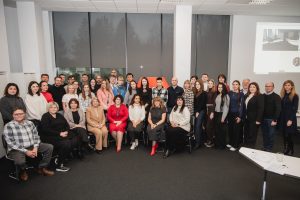
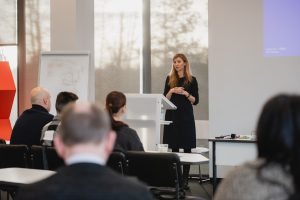
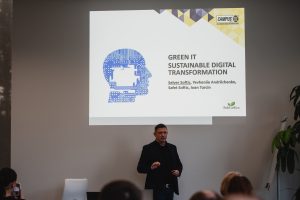
Employer Meetings and Future Career Opportunities
As part of the Vilnius study visit and intensive training, participants took part in meetings with international employers, aimed at strengthening links between higher education and the labour market and highlighting future career opportunities related to circular economy and sustainability.
During the session, representatives of Avia Solutions Group presented how circular economy principles and sustainability thinking are applied in a large international company, discussing the competences and skills expected from future professionals.
Participants were also introduced to the OBT Talent Program, presented by representatives of OBT, including the Group HR Director and CEO. The session focused on career opportunities in international environments, skills development, and professional pathways in emerging markets, with a particular emphasis on sustainability-oriented roles.
These employer meetings provided valuable insights into real labour-market expectations and demonstrated how circular economy competences developed at universities can translate into international career opportunities.
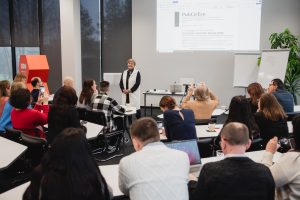
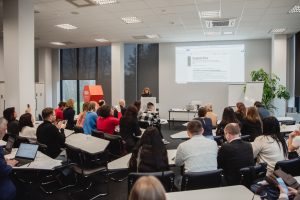
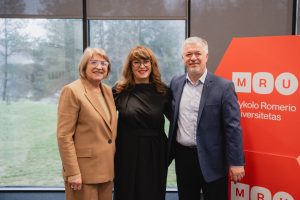
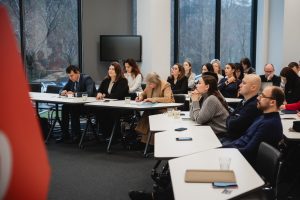
International Conference at Vilnius City Municipality
The study visit concluded with an international conference hosted at Vilnius City Municipality, organised within the framework of Vilnius – European Green Capital 2025. The conference brought together students, academics, public authorities, and business representatives to discuss circular economy implementation, urban sustainability, and the role of higher education in green transition.
By hosting the event at the municipal level, the project highlighted the importance of cooperation between universities, cities, and businesses, while increasing the public visibility of PubCirEco’s contribution to sustainable development and green transformation.
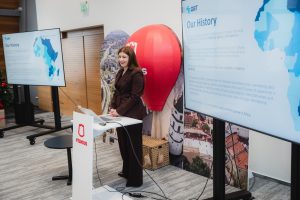
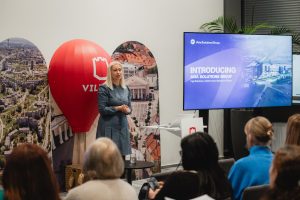
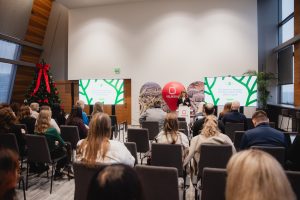
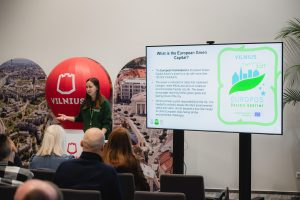
Webinars
Webinar: The Decisive Role of Civil Servants in Integrating Circular Economy Thinking into Higher Education
On 5 December 2025, the PubCirEco project launched its international webinar series with an online event organised by the Department of Public Administration, Public Management, and Economic Policy of Simon Kuznets Kharkiv National University of Economics. The webinar focused on the economic and administrative dimensions of embedding circular economy thinking into European higher education, with particular attention to the decisive role of civil servants in driving this transition.
The webinar brought together academics, economists, and public-sector experts to explore how public authorities and higher education institutions can jointly support the transition from linear to circular economic models. The discussions focused on the economic rationale for Circular Economy, institutional readiness for change, and the role of public policy in enabling sustainable transformation.
The programme featured expert contributions addressing the economic foundations of Circular Economy integration in higher education, societal and institutional readiness for circular transformation, regulatory and governance drivers, and the contribution of public action to education and regional development. An interactive discussion session allowed participants to exchange views on policy instruments, economic mechanisms, and the responsibilities of civil servants in supporting systemic change.
This webinar is part of a series of at least six online webinars planned within the PubCirEco project, each organised by a partner institution and dedicated to Circular Economy topics in different national and thematic contexts.
Modules
Building on the shared curriculum framework developed within PubCirEco, the project is introducing a set of interdisciplinary Circular Economy study modules, each worth 3 ECTS. The modules are mainly designed for Master’s level students, but their flexible structure allows universities to integrate them into existing programmes or offer them as standalone courses.
The modules explore how Circular Economy principles can be applied in different professional fields, including:
-
Public administration and governance (such as transport, energy, and environmental management),
-
Business, economics, and management,
-
Technology, engineering, and digital solutions,
-
Finance, sustainability indicators, and resource efficiency.
What makes these modules practical is that they are directly based on the mapping results and respond to real needs identified in public institutions and the labour market. Students work with real-life case studies, policy challenges, and problem-solving tasks, helping them translate Circular Economy ideas into everyday professional practice.
Learning goes beyond traditional lectures. Each module uses innovative teaching approaches such as problem-based learning, interactive and peer-to-peer activities, crossover learning, and the co-creation of digital learning materials. This hands-on approach strengthens critical thinking, collaboration, and practical skills, preparing future professionals and public employees to actively support the shift from linear to circular systems in their organisations and communities.
Curriculum Design and Course Development
To ensure quality and consistency across all partner universities, the PubCirEco project team developed a common template for Circular Economy courses together with clear guidelines for modern teaching methods. This approach ensures that all modules follow the same structure and quality standards, while remaining flexible and adaptable to different institutional and national contexts.
Using this shared framework, partner universities from Ukraine and Moldova developed 12 interdisciplinary Circular Economy module descriptions. The modules cover a broad range of topics, including circular governance and leadership, law and resource use, systems thinking, circular business models and reverse logistics, Green IT and digitalisation, sustainable engineering design, automation, and Circular Economy metrics and indicators.
The following universities are responsible for developing the individual modules, with designated academic coordinators for each course:
Sustainable Performance and Quality for Circular Economy and a Sustainable Future
Moldova State University (USM)
Public Management and Leadership on the Socio-Ethical Foundation of Organisation
Academy of Economic Studies of Moldova (ASEM)
Law: Waste and Resource Use in Circular Economy
Simon Kuznets Kharkiv National University of Economics (KhNUE)
Systems Thinking in Circular Economy Future: From Technogenic Changes to Better Health Care
Open International University of Human Development “Ukraine” (UU)
Strategic Management of the Circular Economy
Academy of Economic Studies of Moldova (ASEM)
Innovative Technologies and the Economy of Closed Cycle
Technical University of Moldova (UTM)
Intelligent Automation for Circular Economy Business Models
Kharkiv National University of Radio Electronics (NURE)
Business Models and Reverse Logistics
Moldova State University (USM)
Green IT, Sustainable Technologies and Datafication
Simon Kuznets Kharkiv National University of Economics (KhNUE)
Sustainable Engineering Design
Open International University of Human Development “Ukraine” (UU)
Green Automation for Environmental Sustainability
Kharkiv National University of Radio Electronics (NURE)
Circular Economy Metrics and Indicators for Environmental Sustainability
Technical University of Moldova (UTM)
Innovative Teaching Methods
In parallel, the project prepared Guidelines for the Use of Teaching Methods, supporting lecturers in applying innovative and engaging learning approaches. These guidelines explain how each method works in practice, what learning outcomes can be expected, and how student work can be assessed.
Together, the modules and teaching guidelines ensure that Circular Economy education within PubCirEco is practical, engaging, and ready for real-world application, while also fostering cooperation between partner universities and academic staff across countries.
eLearning Platform
To make Circular Economy learning accessible, flexible, and engaging, PubCirEco is developing a dedicated eLearning platform that brings together modern study materials, practical examples, and opportunities for international collaboration.
The platform will host digital Circular Economy modules, complemented by interactive content such as case studies, visual materials, and real-life examples. Learning will go beyond reading and listening: students will actively work on challenges, discuss ideas, and apply Circular Economy principles to real-world situations.
Designed with learners in mind, the platform supports innovative teaching approaches including problem-based learning, interactive activities, peer collaboration, and student-created digital content. Teachers can easily integrate the platform into their courses, while students can use it for independent learning, teamwork, and skills development.
The eLearning platform also creates a shared virtual space for students, PhD researchers, and lecturers from different countries to learn and work together. It encourages cross-border exchange, new perspectives, and collaboration across disciplines.
With flexible online access, the platform is especially valuable for students and staff with limited mobility and for universities seeking to expand their international reach. In the long term, it will help ensure that PubCirEco’s learning materials remain available, up-to-date, and useful beyond the lifetime of the project.